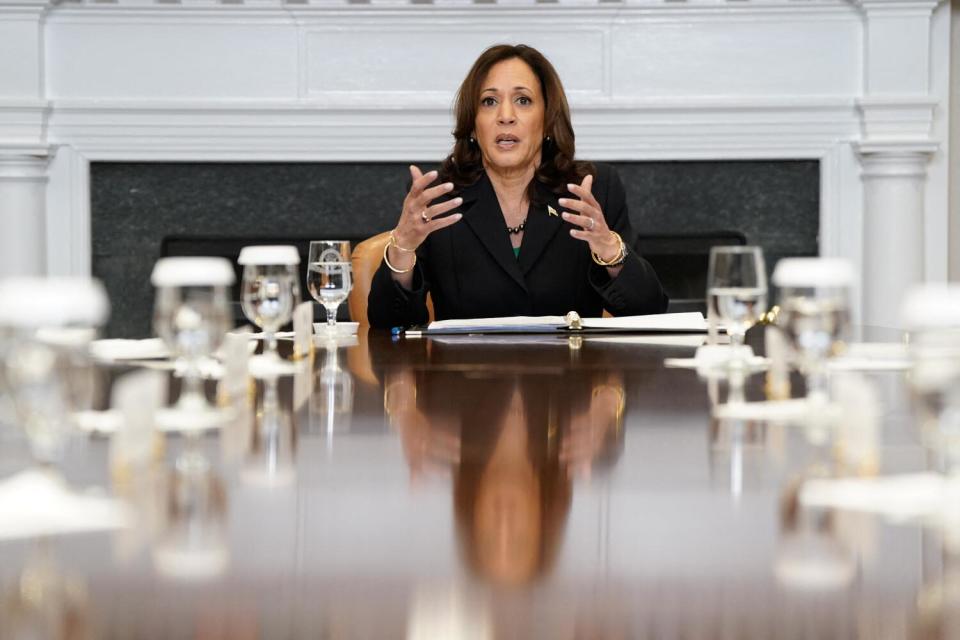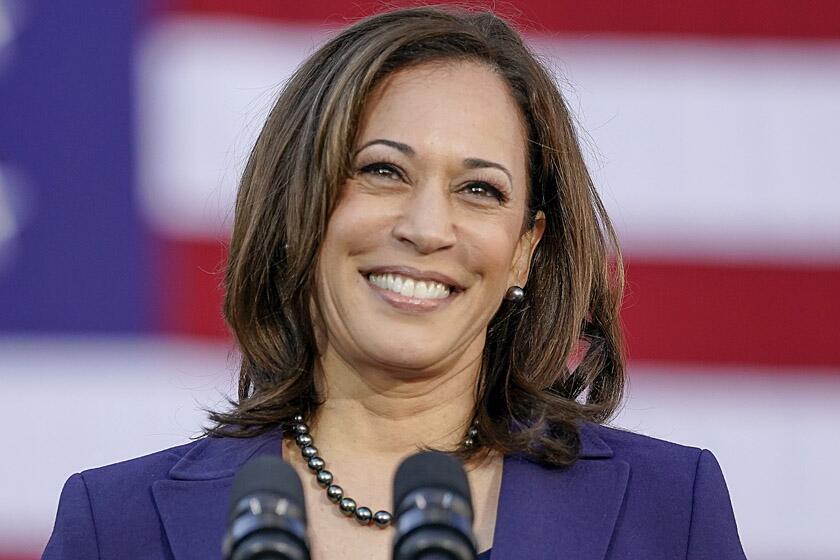It’s been a week since President Biden’s disastrous debate performance, and his political fortunes only appear to be growing worse by the day.
His poll numbers are dropping. Donald Trump is gloating. And Democrats are in a full-fledged panic about the future, some feeling deceived by the president’s handlers and angry that his inner circle appears to be blaming everyone but themselves for last week’s debacle.
Now it all boils down to two questions: Will Biden will drop out of the race? And who is in the top position to replace him?
The answer to that the second question should be a no brainer — the vice president, of course.

Kamala Harris was chosen by the people as an official replacement for the 81-year-old president should he become unable to fulfill his duties, so it stands to reason she’d be next in line, just as Biden was for Barack Obama. Harris served in the U.S. Senate, was attorney general of California and before that, San Francisco. Clearly she has the experience. As for her debate skills — she’s a former prosecutor. Trump is a convicted felon. What more could you ask for in this cage fight of an election?
Yet the 59-year-old Harris is hardly a shoo-in to replace Biden. Discussions among pundits and regular folk about the VP’s electability often start from a place of reticence, informed by an unfounded, common belief that she’s an unpopular long shot. Then it’s on to lengthier conversations about Gavin Newsom. Or Gretchen Whitmore. Or Josh Shapiro.
Read more: Ali: Racism and bigotry get a pass in 2024 as Trump talk that once shocked is normalized
I honestly don’t know if Harris can win in November, or if she truly is the best candidate to steer this country away from what appears to be certain ruin if Trump wins. What I do know is that Harris faces a higher bar due to her gender and race. The outright dismissal of her as a serious replacement for Biden is irresponsible, not to mention sexist and racist, and it underscores the double standard that women and people of color face — especially those at the top of their game.
The flipside of that coin is acknowledging that America my not be ready for a female president, let alone a woman of color. Supporting Harris means believing that the electorate is capable of bucking centuries of tradition and bias, and that’s a risky move in an election where the stakes are sky high.
But it may not be as risky as it seems. A new CNN post-debate survey of registered voters shows that in a race against Trump, Harris would place above theoretical candidates Newsom, Shapiro, Whitmer and Pete Buttigieg — and well above Biden.
Read more: Commentary: The presidential debate has outlived its usefulness
Despite evidence showing that she’s a viable choice, Harris still suffers from a lingering criticism that took root during the 2019 Democratic primaries. She was often described in the news media as aloof, distant and not likable.
Call it the Hillary Clinton conundrum. Powerful women have an impossible line to walk, especially in public-facing roles. They must be commanding, but not too demanding. Don’t appear too emotional, but don’t appear cold, either. Don’t push back too hard, but don’t be a pushover ( the “Barbie” monologue comes to mind). Walk a tightrope between strong leadership and pleasant congeniality — in heels — because it’s never enough to be qualified and competent.
Read more: Kamala Harris faces political pressure — and opportunity — as Biden struggles
Democrats and swing voters, you will never get it all in one package. It’s true that Harris doesn’t look all that comfortable at ribbon-cutting ceremonies, but she’s in her element interrogating a sweaty, nervous Mark Zuckerberg or a tongue-tied Justice Brett M. Kavanaugh. And what we need more than anything right now is a fighter.
Harris is a formidable debater. Recall the 2019 Democratic primary debate, when she course corrected Biden on his desegregation record. In a debate the following year against then-VP Mike Pence, she expertly called out his hypocrisy when he accused the Democrats of packing the courts: “Do you know that of the 50 people who President Trump appointed to the court of appeals for lifetime appointments, not one is Black?,” she said. “This is what they’ve been doing. You want to talk about packing a court, let’s have that discussion.” Bam!
As a member of the Senate Judiciary Committee, she questioned Trump’s then-Supreme Court nominee, Kavanaugh, during a 2018 confirmation hearing about the protection of reproductive rights. “Can you think of any laws that give government the power to make decisions about the male body?” she asked.
Kavanaugh paused before answering, “I’m happy to answer a more specific question.”
“Male versus female,” Harris replied. After some back and forth, Kavanaugh acquiesced: “I’m not thinking of any right now, senator.”
Trump later complained about how unfair she was: “She was nasty to a level that was just a horrible thing … the way she treated now-Justice Kavanaugh, and I won’t forget that soon.” You can bet he’d rather go up against anyone other than that “nasty woman.”
It’s more than fair to talk about Harris’ electability. She deserves scrutiny like everyone else whose name is being bandied about as a possible contender should Biden step out of the race . But simply assuming she’s not the right candidate without a deeper exploration of her strengths and weaknesses is unfair for someone as accomplished as Harris.
This story originally appeared in Los Angeles Times.


